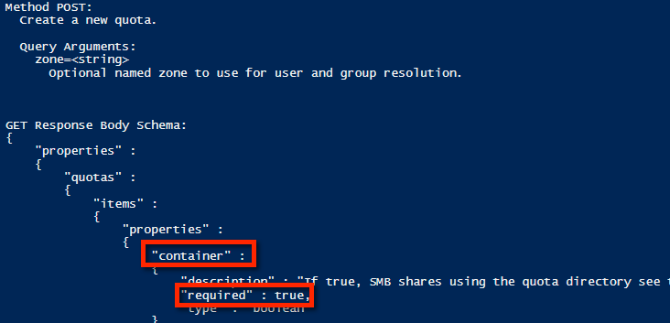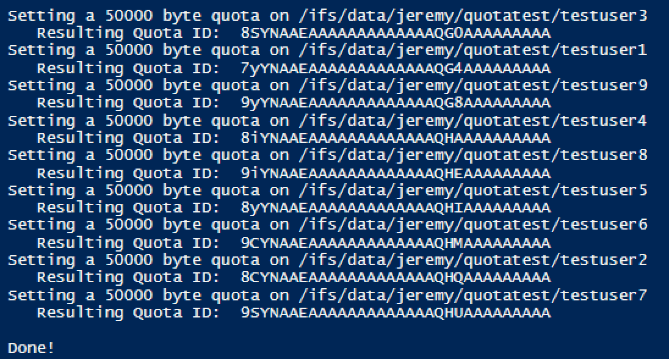Article Number: 000132770
Isilon: Using Powershell with Platform API - Creating Objects and RAN
Summary: This article explains how to use Powershell with the OneFS Platform API to create objects and RAN.
Article Content
Symptoms
Cause
Resolution
Introduction to JSON
The PAPI uses JSON as the data-interchange format and it's critical to understand how to leverage it to use PAPI to create, modify, or delete resources. You can learn more about JSON at www.json.org but the key principle is that it is complete independent programming language and is built on two structures:- A collection of name/value pairs
- An ordered list of values
Example output from getting a system object would look like this:
{
"<object>": {
"<property>": <value>,
...
}
To know what JSON text we need to POST to create an object, look at the PAPI self documentation by sending the following request:
GET /platform/1/quota/quotas?describe
Here is the relevant Powershell code:
#Get PAPI self documentation for quotas
$resource = "/platform/1/quota/quotas?describe"
$uri = $baseurl + $resource
$ISIObject = Invoke-RestMethod -Uri $uri -Headers $headers -Method Get
$ISIObject
The example output below outlines what you need to POST to create a new quota. Pay attention to the required properties since they may not be the same properties required for the corresponding isi command.
Using the example properties, the following is an example JSON string that can be used to create a directory hard quota:
$QuotaObject = @"
{"type":"directory","include_snapshots": false,"container": true, "path": /ifs/home/user1", "enforced": true, "thresholds": {"hard":10000000},"thresholds_include_overhead": false}
"@
With the JSON string completed, all that's left is to build the Invoke-RestMethod parameters and submit. In the example code below, the JSON string is the body of the POST and that the content type is application/json:
$uri = $baseurl + $resource
$ISIObject = Invoke-RestMethod -Uri $uri -Headers $headers -Body $QuotaObject -ContentType "application/json; charset=utf-8" -Method POST
Write-Host " Resulting Quota ID: " $ISIObject.id
Putting It All Together
Using an example, let's assume your environment has many home directories for users under a single parent directory, (example: /ifs/home) and you want to set directory quotas for each of these home directories. Use the Isilon RESTful Access to the Namespace (RAN) API to get the paths to each user home directory. The following code will get the subdirectories of a specified path and then set a directory quota on each subdirectory:
# Get subdirectories of path specified
$resource = '/namespace/' + $path
$uri = $baseurl + $resource
$ISIObject = Invoke-RestMethod -Uri $uri -Headers $headers -Method Get
#Loop through each directory and set the quota
ForEach($folder in $ISIObject.children) {
#Create quota
$resource ="/platform/1/quota/quotas"
Write-Host "Setting a $quotasize byte quota on $quotapath"
$QuotaObject = @"
{"type":"directory","include_snapshots": false,"container": true, "path": "$quotapath", "enforced": true, "thresholds": {"hard":$quotasize},"thresholds_include_overhead": false}
"@
$headers = @{"Authorization"="Basic $($EncodedPassword)"}
$uri = $baseurl + $resource
$ISIObject2 = Invoke-RestMethod -Uri $uri -Headers $headers -Body $QuotaObject -ContentType "application/json; charset=utf-8" -Method POST
Write-Host " Resulting Quota ID: " $ISIObject2.id
}
Here is the output from running the script attached to this post:

Article Properties
Affected Product
Isilon, PowerScale OneFS, Isilon Platform API
Last Published Date
12 Oct 2023
Version
5
Article Type
Solution